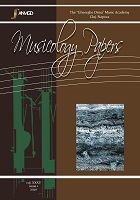The Influence of Political Regimes on Romanian Psaltic Music in the Second Half of the 20th Century
The Influence of Political Regimes on Romanian Psaltic Music in the Second Half of the 20th Century
Author(s): Elena ChircevSubject(s): Customs / Folklore, Music, Post-War period (1950 - 1989), Transformation Period (1990 - 2010), History of Communism, Sociology of Art
Published by: MediaMusica
Keywords: Byzantine monody; communist period; neumatic notation; Romanian Revolution of 1989; tradition;
Summary/Abstract: During the second half of the 20th century, the Romanian society was marked by two events that had a profound impact on its destiny: the establishment of the communist regime after the abdication of King Michael I in 1948, and the Romanian Revolution of 1989, which marked the end of this regime. The Byzantine monody has had a millenary tradition in this part of Europe, and the contribution of the local chanters to the perpetuation of Orthodox church music – also through their own compositions – is evidenced by the numerous manuscripts written by Romanian authors and by the works printed in the last two centuries. In 20th-century Romania, the music written in neumatic notation specific to the Orthodox Church manifested itself discontinuously due to the historical events mentioned above. The church chant in the traditional psaltic style managed to survive, despite being affected by the Communist Party’s decisions regarding the Church, namely the attempt to standardize the church chant. This paper captures the way in which the preservation of tradition and the perpetuation of church music succeeded through the difficult times of the communist period, with special emphasis on the religious music written in neumatic notation and on certain peculiarities of the period, due to the political regime. The musicians trained before the establishment of Communism – by teachers concerned with the preservation of the good tradition of church chanting, in monastic schools and prestigious theological seminaries of the interwar period – were the binding forces who ensured the rapid revival of the music of Byzantine tradition in the last decade of the 20thcentury and who enriched the repertoire of the Romanian churches with valuable original works.
Journal: Lucrări de Muzicologie
- Issue Year: 34/2020
- Issue No: 1
- Page Range: 7-34
- Page Count: 28
- Language: English
- Content File-PDF

